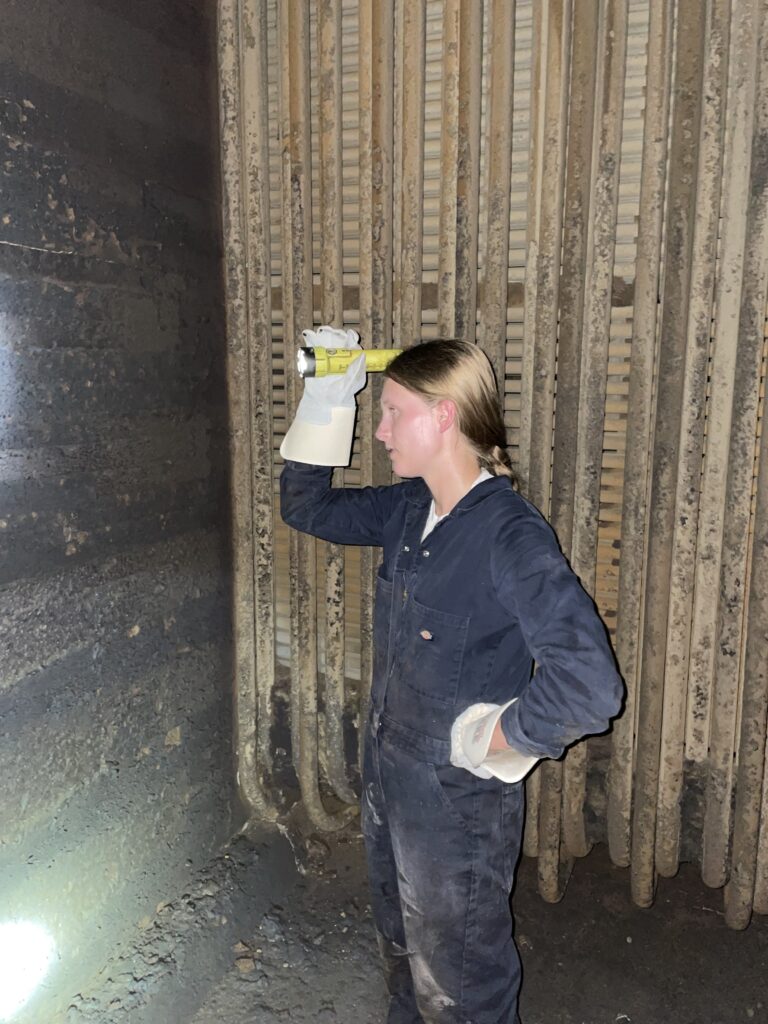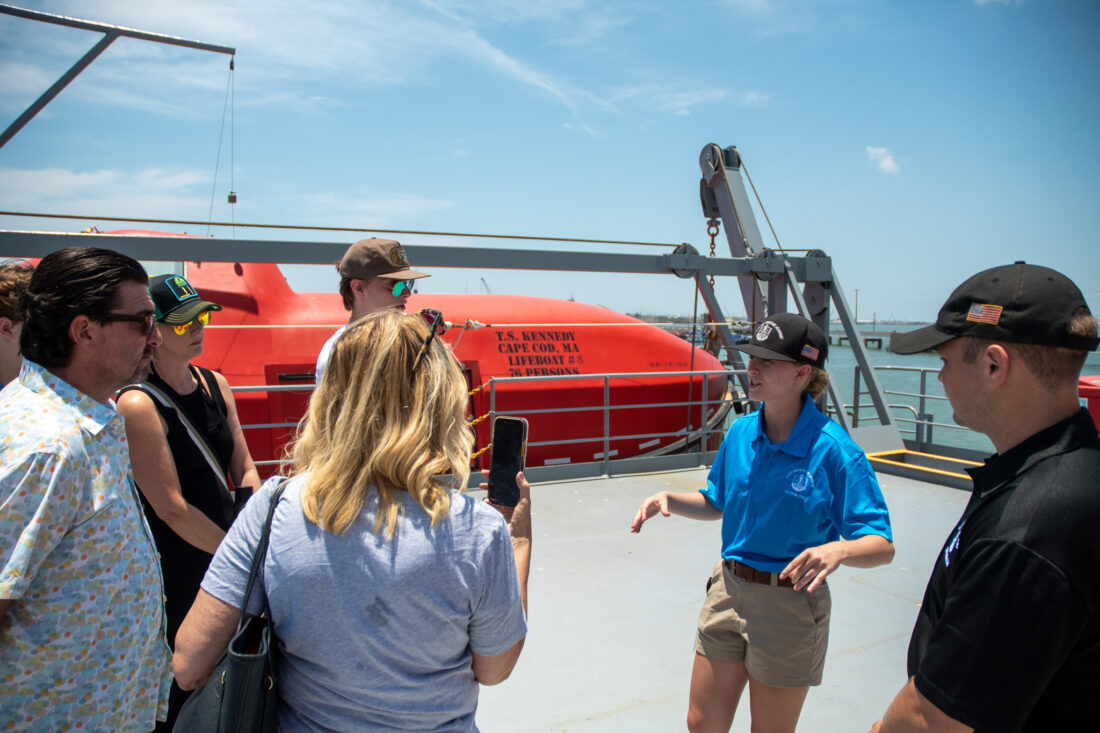Commercial Sea Term Q&A With Cadet Tyler Heffernan
Tyler Heffernan '25 talks about her experience on commercial sea term.
Bldg. 311 sat down with Tyler Heffernan ’25, a marine engineering technology student that recently returned to Galveston from her commercial sea term. She spent her summer at sea with Flex LNG on a liquid natural gas (LNG) tanker in the first class of engineering students to get an LNG billet.
You just got back to Galveston on August 22 from almost three months at sea. What was your day-to-day life like?
Most days were routine work days. I’d start in the engine room at 0730 for a morning meeting where we’d plan the day’s tasks. I primarily worked with the 4th engineer, who is a close equivalent to a 3rd engineer in the American system. The tasks weren’t glamorous, but were essential for the ship’s operation.
What was it like working for a foreign-flagged ship?
The experience was really eye-opening for me. I learned about the seafaring culture in other parts of the world. In Romania, it seems like seafaring is a really popular career, especially compared to the United States where it’s definitely lesser known. It was really interesting to hear about the education that officers get in other countries, and we talked about the similarities and differences on a daily basis.
On the flip side, communication was definitely challenging because of the language barriers – the crew was mostly Eastern European or Filipino. We frequently relied on Google Translate. It could get a little isolating, especially if there were conversations going on around me that I couldn’t understand. I can’t lie, it kind of got to me at times. You’d be sitting on your break and there would be a couple guys speaking Russian next to you with no real way for you to have a meaningful conversation.
It’s a big deal that you received an LNG billet. Why is this so significant?
LNG is a greener option in the world of shipping, and it’s a newer fuel that everyone seems to be talking about. Although deck cadets have received an LNG billet before, none of our engineering students have gotten that experience yet. Being on an LNG ship this summer starts the process of getting certified to work on an LNG vessel.
Did any experiences really stand out to you?
I’m going to be honest, a lot of it was really repetitive work and some of it blends together. We didn’t get off the ship the entire time. We left from Freeport, went around Cape Town, sailed by Singapore, and docked in South Korea and then took the same route back home.
But a real highlight was when we crossed the equator for the first time and did an equator crossing ceremony. It was the first time all of the crew got together to have fun and enjoy a day off. We brought our food outside and had a makeshift picnic. It was my first time crossing the equator, along with the other student from Texas A&M, a few cadets from other maritime academies and a few rates. It was the first time peoples’ walls came down.
Tell me about that ceremony – what did you do?
For the engineers, they took a 55 gallon drum, filled it with seawater and dropped nuts and bolts in the bottom. We had to hop in the barrel, fish out the hardware, and put it together – all blindfolded. The deckies had their own ceremony. It was the first time we got to interact with each other on a personal level and not just as coworkers.
How did your previous sea term compare to this year?

My first sea term was on the TS Kennedy, so the transition from a 60-year-old ship to a three-year-old ship was significant. The engine rooms are totally different, and I had to adjust to modern automation that the Kennedy just doesn’t have. One of our first days underway, I was asked to close a valve in the engine room, so I went to turn it manually only to find out that I needed to close it on the screen. That was really cool – I’ve seen that in our simulators but never in real life. It took a lot of getting used to.
The Kennedy definitely taught me to problem solve, which was hugely useful. A big difference, though, is that very few of the issues on the Kennedy are novel problems, compared to this ship which has the potential to run into problems that nobody in the fleet has ever dealt with before. It really emphasized the importance of having experienced and competent officers on board, because although we had shore support, we were often on our own to fix it.
There were way less crew, as well. There were maybe 30 people tops, and four of us were cadets, compared to the hundreds of people on board during my first sea term. That was an adjustment for sure.
It was also really nice to get paid to go on sea term.
You’re graduating in less than a year, so let’s talk about your experience as a student. What’s it like? How did you get to where you are now?
I actually just had this amazing full circle moment with a fish (a freshman cadet). When I was working on the General Rudder, during Aggieland Saturday by the Sea I met a girl and her mom. The girl was really interested. She asked a lot of great questions and we had a good discussion. After Orientation Week, or O-Week, we saw each other and she was like, “I did it! I’m here!” and that’s part of the reason she chose the Galveston Campus was because I was so open with her on the ship. Although she’s a deck cadet instead of engine, It was very cool to get to see the whole thing play out.

I started with an interest in mechanical engineering and a love of working on boats, and while considering different degree programs discovered marine engineering technology, a nice combination of my interests. Although I wasn’t originally in the license option program, after hearing my friends talk about their experiences at sea, starting salaries and career opportunities, I decided that I better take advantage of it while I’m here. Although being a fish as a sophomore wasn’t the most fun I’ve ever had, I’m so glad I made the switch.
Being in the maritime academy provides these really incredible leadership opportunities, and just a few years ago I never thought I would be leading people. For example, last year, I was the engineering training officer, so I got to provide supplemental practical education to fish that they’ll need for sea term. My whole focus in that role was to better prepare them. Learning time management and prioritization required to take on roles like that has helped me, as well, in a professional sense. It also gives you a chance to figure out your leadership style and work through your mistakes in a safe environment.
That’s so cool! So do you know what’s next?
After graduation, I’m hoping to join the Marine Engineers’ Beneficial Association (MEBA), which will give me a little flexibility while starting out. Being at sea this summer reaffirmed that I want to sail after I graduate, but it’s important to me to find a balance between work at sea and time at home and MEBA gives me that opportunity. The maritime academy has been a home-away-from-home for me, but I’m excited to get out in the industry and see what my career holds.
But for now, I’m excited to get my senior year started.